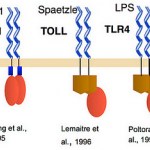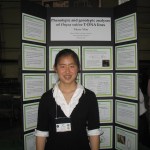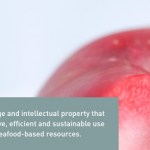biofortified
"Nothing more fun than making discoveries in nature and then seeing them used for the public good "
Listen to the NPR interview with enthusiastic Professor Emeritus Murray Gardener.
He describes recent UCDavis symposium with 2011 Nobel Laureates Bruce Beutler and Jules Hoffman
The University of California, Davis, will host two Nobel laureates for a symposium this month about the shared characteristics of plants, flies and people in terms of how they fight infections.
"Evolution of Common Molecular Pathways Underlying Innate Immunity" will feature the 2011 Nobel Laureates in Physiology or Medicine, Jules Hoffmann of the University of Strasbourg, France, and Bruce Beutler of the University of Texas Southwestern Medical Center, Dallas. Luke O'Neill, professor of biochemistry and immunology at Trinity College, Dublin and I will also give lectures.
The symposium is…
Another vigilante for truth. Lithodid man exposes Jeffrey Smith #antiGMO fraud in this entertaining video. Well done Lithodid.
Another vigilante for truth. Lithodid man exposes Jeffrey Smith #antiGMO claims to light of day in this entertaining video. Well done Lithodid.
Jonathan Eisen, scientist and blogger extraordinaire has established a science writing series called "Story behind the paper". The idea is for authors who have recently published Open Access papers to tell the story behind the paper: what sorts of experiences and experiments led up to the new discovery and how we navigated through the publication process. Several years ago Jonathan patiently explained to me what a blog was and got me started with science blogging. He recently kindly extended an invitation to write story about our discovery of a new communication code in disease causing…
This excellent New York Times article describes Eric Lander's journey in science to his position today as not only one of the great genome researchers but a terrific teacher and human being.
In Memoriam,
by Alfred, Lord Tennyson
Ring out, wild bells, to the wild sky,
The flying cloud, the frosty light:
The year is dying in the night;
Ring out, wild bells, and let him die.
Ring out the old, ring in the new,
Ring, happy bells, across the snow:
The year is going, let him go;
Ring out the false, ring in the true.
Ring out the grief that saps the mind
For those that here we see no more;
Ring out the feud of rich and poor,
Ring in redress to all mankind.
Ring out a slowly dying cause,
And ancient forms of party strife;
Ring in the nobler modes of life,
With sweeter manners, purer laws…
Consumers are asking us many questions about biotech seeds and traits. They want to know why some farmers may choose to use them and what the long-term implications are not only for our health but also for the farming/ranching industry.
All of the challenges and issues facing the agriculture industry are very complex and multifaceted. The issue of using biotech seeds and traits is no different. U.S. Farmers & Ranchers Alliance (USFRA) has encouraged farmers and ranchers to share their experiences and provide some insight into why they choose - or choose not - to use biotech seeds.
They…
The day your son asks for a genetically engineered glow-in-the dark zebra fish and your wife desires a mauve rose may be the day that public acceptance of plant and animal genetic engineering has finally arrived.
Last week the U.S. Department of Agriculture concluded that a new variety of rose, genetically engineered to be an unusual shade of blue, does not pose a risk to the economy or ecosystems. This decision paves the way for the company, Florigene, to sell cut roses in the US. The mauve creation is based on the discovery by Davis-based biotech pioneer Calgene Inc, which isolated the "…
Two great scientists, Bruce Beutler and Jules Hoffman, who have changed the way we view the immune response of plants and animals, have been awarded the 2011 Nobel Prize in Medicine.
Tragically, Dr. Ralph M. Steinman of Rockefeller University, who discovered a new class of cell, known as dendritic cells, which are key activators of the adaptive immune system dies a few days ago. It is unclear if his family will be able to share the prize because Nobel Prizes are not awarded posthumously.
Hoffman's group showed that Drosophila Toll, originally known for its function in development, is also…
Strawberries are a particularly pest prone crop.
To control these pests, more than 9.5 million pounds of pesticides, including over 3 million pounds of methyl bromide, a toxic ozone-depleting chemical is applied each year. Methyl bromide is also associated with an increased risk of prostate cancer in farm workers.
We all like strawberries, but this pesticide use seems excessive: more pounds of pesticides were applied to 28,000 acres of strawberries than to 780,000 acres of cotton (and cotton is one of the world's most pesticide intensive crops).
To avoid contributing to the use of methyl…
Generalizing about "GMOs" is almost completely useless. Each food we eat and each farm is so different that the genetic technologies and farming practices needed to optimize sustainability must be different too. That is why each crop (GE or conventional) must be looked at on a case-by-case basis, using science-based evidence.
I recently wrote a short Scientific American guest blog post for their "Passions of Food" day examining how cotton genetically engineered to express the organic protein Bt is affecting agriculture today. Thanks to Bora Zivkovic, former ScienceBlogger, for this…
Peter Kareiva, the chief scientist for The Nature Conservancy, recently gave a seminar at the Long Now Foundation. His talk was summarized by Stewart Brand:
Kareiva began by recalling the environmental "golden decade" of 1965-75, set in motion by the scientist Rachel Carson. In quick succession Congress created the Clean Air Act, the Clean Water Act, and the Endangered Species Act---which passed the Senate unanimously.
Green influence has been dwindling ever since. A series of polls in the US asked how many agreed with the statement, "Most environmentalists are extremists, not reasonable…
This week, the G20 Agriculture Ministers gathered for their first-ever meeting to discuss potential measures to address price volatility and record high food prices. The key to any long-term solution is acknowledging that we need to empower the very people whose lives are most affected by food shortages. Three-quarters of the world's poorest people get their food and income by farming small plots of land. The potential of small farmers for getting us out of this and future food crises cannot be overstated.
Today, we find that millions of lives depend upon the extent to which agricultural…
The journalist Marc Gunther recently posted a thoughtful article discussing public perceptions of the role of organic agriculture in a future sustainable food system.
He found that many consumers believe that there are only two ways to produce food:
"The first can be described, depending upon who's talking, as big, fast, modern, conventional, industrial, intensive, chemical, genetically-modified, processed and global. It's the system that delivers most of the food that most Americans eat."
"The second is described as organic, sustainable, local, small-scale, family-owned, natural, agro-…
No investigation without wonder, no observation without joy, no understanding without humility.
Today Malinee Sriariyanum was awarded the John E. Kinsella Prize for her work on isolation and characterization of the Ax21 pathogen associated molecular pattern.
The joyful awardee and her proud mentors:
Associate Dean Jan Hopmans, Malinee Sriariyanun, and myself
Guest Post: Dr. Robert L. Thompson is a senior fellow for The Chicago Council on Global Affairs and professor emeritus at the University of Illinois at Urbana-Champaign
Over the past few months, we've watched as governments have been overthrown in Tunisia and Egypt, as governments across North Africa and the Middle East promised reforms, some even handing out cash to pacify angry citizens, and as demonstrations in Libya intensified into outright civil war. Although a number of issues have come to a head, one constant across countries is the rocketing prices of basic commodities, and the…
Merry Mou won first place in the Synopsys Silicon Valley Science and Technology Championship. 700 to 900 students participate with their research projects in a variety of categories, including physics, biology, and computer science. Winners are chosen to go on to state and national competitions.
Merry Mou won 1st place in Botany in the 2010 Championship for her project, Phenotypic and Genotypic Analyses of Oryza Sativa T-DNA Lines, which was completed in the summer of 2010 as part of the Young Scholars Program under the guidance of postdoctoral fellow Manoj Sharma. She will be participating…
Today we took the children to Table Mountain, a volcanic mesa in northern California.
It is a special place, preserved from development by the dense, rocky texture of the soil- no good for farming. We strolled through carpets of flowers Lasthenia californica (California goldfields). Blemnosperma nanum (yellow carpet), Lupinus nanus, Triteleia ixiodies (pretty face), Castilleja exserta (purple owls clover), Triphysaria eriantha (Jonnytuck or Butter 'n' eggs), Eschscholzia caespitosa, (foothill poppy), popcorn flower and gaze at the box kites flying overhead. The blue, grey and white match the…
I walked into the gleaming 'Orchard in a box", a closed greenhouse where no pollen can flow outside. The apple was red, red, red inside and out and I wanted it. But because I was in New Zealand, where experimenting with genetically engineered food is highly regulated, tasting was banned.
How was this forbidden fruit created? By overexpression of an apple transcription factor in the white-fleshed, tasty Royal Gala variety. The transcription factor was isolated from an apple that has both red flesh and red skin, that occurs in Central Asia. However, these apples are normally quite bitter…







